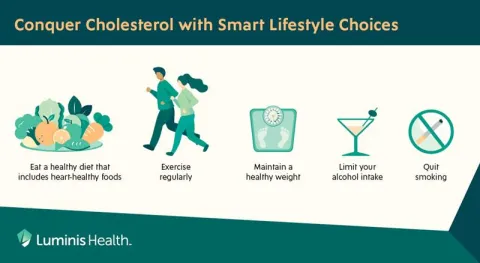Effective January 20, 2026, masks are encouraged for all staff, patients and visitors at all Luminis Health locations and will remain encouraged through the end of the influenza season. Thank you for your patience as we continue to care for our community.

Heart disease is the number one cause of death in Americans. There are certain factors that are not controllable: age, gender and family history of heart disease. Fortunately, there are many key steps you can take to lower your risk of heart disease.
Quit Smoking
Smoking, namely the chemicals in tobacco, can increase your blood pressure and damage your heart and its blood vessels. It is never too late to quit. Your risk of heart disease drops after quitting and your risk of coronary artery disease is the same as a non-smoker after 15 years of quitting.
Maintain a Healthy Weight
Being overweight can lead to conditions that increase your chances of heart disease. You may use the body mass index (BMI) to get a general sense of whether you have a healthy weight. However, BMI does not take into consideration factors like muscle content. Another useful tool to use is waist circumference. Men are considered overweight if their waist measurement is greater than 40 inches and for women, greater than 35 inches. Eating a heart-healthy diet is a great way to lose weight. This includes avoiding salt and processed sugars, increasing your fruit and vegetable intake, eating whole grains, and limiting foods with saturated or trans fats. Even a small weight loss can be beneficial in lowering your cholesterol and sugar levels.
Exercise
Exercise helps control your weight and reduce your risk of developing other conditions that affect your heart, like high blood pressure, high cholesterol and diabetes. The goal is to get at least 150 minutes of moderate exercise a week (for example, walking briskly). Every little bit helps — take the stairs, park your car far away or go for a walk with your family.
Get Regular Checkups and know Your Numbers
New blood pressure guidelines from the American College of Cardiology/American Heart Association have emphasized the importance of controlling your blood pressure, and in turn, lowered the definition of high blood pressure. High blood pressure is a major risk factor for heart disease and stroke. High cholesterol is another risk factor. High cholesterol can clog your arteries and raise your risk for having a heart attack. Have your physician check your cholesterol levels regularly. It’s also important that you get screened for diabetes. Adults with diabetes can be two to four times more likely to die from heart disease than adults without diabetes.
Make Sleep a Priority
If you don’t get enough sleep, your risk of diabetes, obesity and hypertension goes up. Practice good sleep hygiene: set a sleep schedule and try to stick to it, avoid caffeine later in the day and avoid screen time before bed. If you feel as if you’re not getting good, quality sleep, you may want to ask your doctor if a sleep study would be beneficial.
Manage your Stress Levels
Stress can raise your blood pressure and “extreme” stress has been known to “trigger” heart attacks. Our coping mechanisms for stress are sometimes not ideal — like overeating and smoking. Focus on different stress relief techniques, like exercise, mindfulness and meditation.
 Sadia Shafi, MD, is a cardiologist at Anne Arundel Medical Group (AAMG) Cardiology Specialists.
Sadia Shafi, MD, is a cardiologist at Anne Arundel Medical Group (AAMG) Cardiology Specialists.


